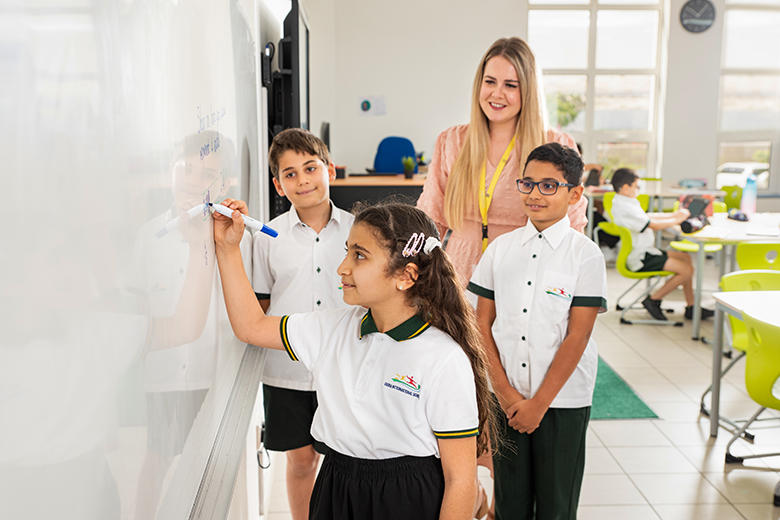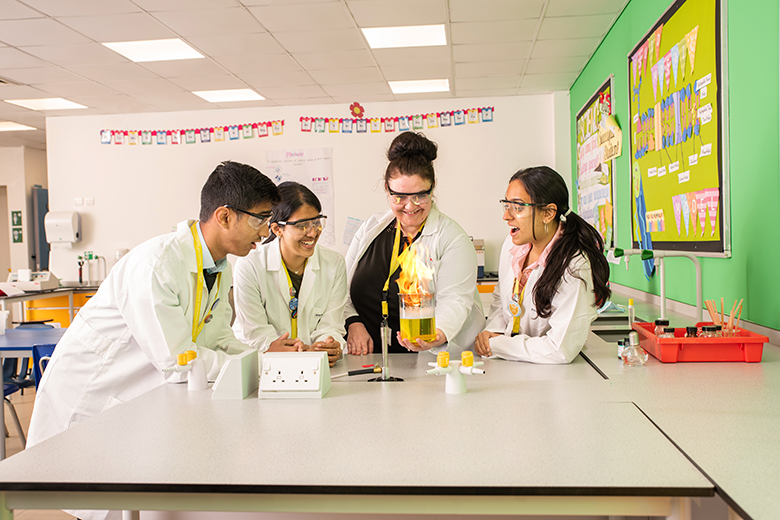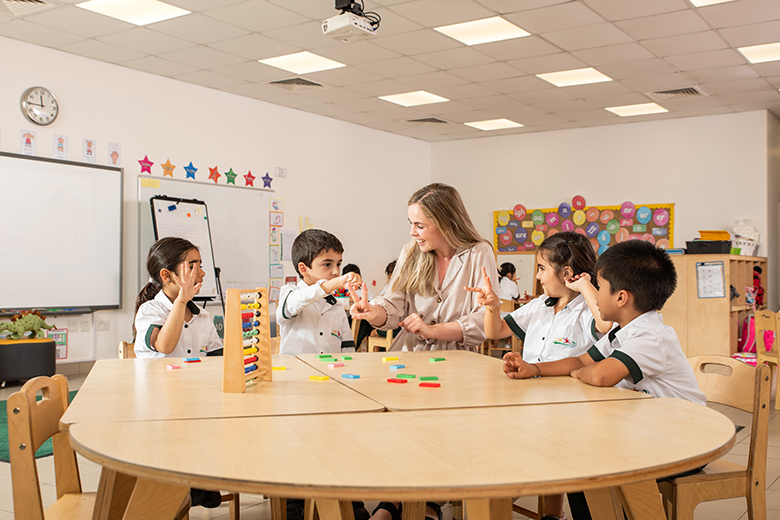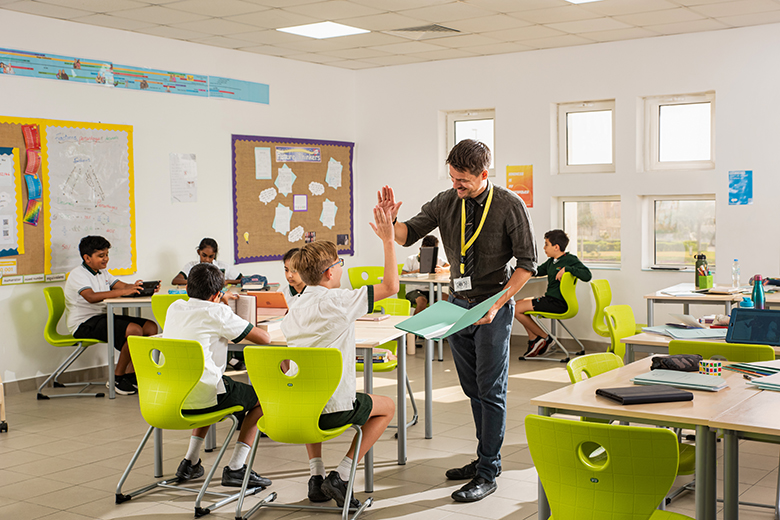At Deira International School, they ensure that all students fulfil their potential in an inclusive, forward-thinking and safe environment, in which each child’s individuality is valued and encouraged. A member of the Al Futtaim Education Foundation, the school is proud of its ability to foster partnerships with students, parents, staff and the wider community, with a holistic approach to education dictating an enriching and varied school experience in both the classroom and beyond. Education UAE spoke to the school’s Director, Simon O’Connor, about the curriculum, the rise of technology, wellbeing, the arts, and much more besides.

“We have 1800 students at Deira International School (DIS) and run the English National Curriculum from the age of three; so, at the earliest foundation stage right the way through to 16-year-olds taking GCSEs,” Simon begins. “However, post-16 is where we diverge a little bit with the curriculum in that we do the International Baccalaureate (IB), which of course is not unique. But what I think is unusual is that we do a variety of IB options, such as the IB Career-related Programme (IBCP) and the IB Diploma Programme (IBDP).”
The career-related programme is obviously assessed in a very different way, but what’s really distinctive at DIS is that students have the opportunity to take up internships with the Al Futtaim Group, with Simon explaining: “Let’s be honest, there are internships available that are a complete waste of time. Essentially students are there to make the tea or do the filing. But this is absolutely not the case with us. The students who do internships cover a wide variety of specialisms, from HR to legal, and everything in between. This puts them in a very good position to be able to ask important questions, as well as preparing them for the world of work, which is fundamental to the Al Futtaim Education Foundation vision.”
The Need for Human Interaction
The modern workplace has been impacted significantly by the rise and ongoing advancement of technology. Millennials and now Generation Z are the ones that have fuelled this revolution, relying on continual advancements in technology to enact efficient changes within their organisations. But are we in danger of losing the personal touch?
“Absolutely. One of the things, when Covid arose, was that certain parts of the education sector almost gloried in the fact that we don’t need schools; actually, I think the reverse is true. If the lockdown showed us anything it is that human interaction is fundamental. I don’t like the word facilitators, I prefer teachers because I think teachers do so much more than facilitate.
“I think today schools are reversing the situation, from developing and encouraging technology to almost putting the brakes on it. Interestingly, DIS won an award two years ago for the use of technology in the classroom. It was an international school award and we’re very proud of it, but in the last six months, we have, for example, returned to exercise books. Technology is great and it’s really important, and we are a technologically fluid school, but there’s more to it than that.
“Emails are becoming a bit of a thing of the past, it’s just dinosaurs like me that use them. Our students, though, work seamlessly off TEAMS, with its whole battery of technology and apps. Yet while we can use that, our young people still need to be able to use exercise books. We also need to train students on how to use technology effectively, which will continue to evolve and gather pace (the introduction of artificial intelligence will grow in schools) but it’s not a panacea, it doesn’t solve every problem, and actually, I think Covid taught us that.”
“The students who do internships will cover a wide variety of specialisms, from HR to legal, and everything in between”
Do You Need Help with Anything?
Technology is vital in today’s world, but then so are people and their dreams, desires, worries and anxieties. This is why DIS has created a wellness structure that is as broad as it is professional. “We’ve got a whole variety of different ways we support wellbeing. A simple and obvious solution is that in the past we had a wellbeing counsellor in our secondary school, but now we have a complete team. There is a counsellor in primary school and a wellbeing counsellor in secondary school, and they both work very closely together. In addition, we also have what we call a wellbeing hub where all of this is coordinated, so the wellbeing team talk to the pastoral team, which will talk to the medical team, so we’ve developed that side of things considerably.
“Furthermore, we now have embedded structures to ensure that we’re doing this correctly. I do think this is a way in which technology can be harnessed well. We have an app where once a week we check in with the students, and we have a series of domains where we are asking them about how they feel, and that helps to build a profile of the student. The first question is, “Do you need help with anything?” If the student says “no,” then it stops there. However, if they do have a concern, the app sends an alert to one of our team and they are with the student within minutes.”

Welcoming Parents Back to School
Good parent-school partnerships are one of the best ways to support children’s learning, development and wellbeing, and at DIS they are committed to keeping parents involved in the school community, as Simon explains: “Schools should be joyful places and it’s a cliche to say that they are the best years of your life, but they should be. I see it as a responsibility to ensure that’s the case. I can’t make sure everyone’s happy every day but one of the real joys this term is we’ve been able to have parents back on-site for the first time in two years. Throughout the pandemic, the joy had gone, but now it’s back. I really can’t overemphasise how nice it’s been to have parents on-site every day.”
The parent-teacher meetings at DIS are just the tip of the iceberg. The school runs sessions every morning for parents – information sessions, perhaps how to help with a child’s homework, or it could be an explanation of the early years’ goals for parents, anything that affects the children. There are a number of councils too, including a parent association that looks at school events and another that considers the strategic direction of the school. There is also an Emirati parent council.
“One of the top nationalities of students in our school is Emirati,” Simon says, “which is obviously a culture that we want to ensure is preserved and celebrated correctly, and the parent council helps us to achieve that.” There are school basics such as weekly newsletters and video diaries too. There’s a whole range of ways in which the school works and communicates with parents.
“I think today schools are reversing the situation, from developing and encouraging technology to almost putting the brakes on it”
Self-Discovery
“One of the things that frustrate me is when certain people say that schools haven’t changed in 30 years. Well, anyone close to the education sector knows that schools have changed dramatically, and one of the things that has enabled that dramatic change is the breadth of the curriculum.
“An hour ago, I was in an assembly where singing and dancing were absolutely central because music and the arts are an important part of our curriculum. One of the exciting things we’ve introduced this year is a link-up with an organisation called Arts International, which sends recent graduates to DIS to help develop the arts.
“But I think as someone with a particular passion for music, there’s a misconception about the arts and what they can deliver in a cross-curricular way. So while we support our drama students when it comes to such things as auditions, we also offer leadership coaching in drama classes to student leaders to help them obtain good public speaking skills. At DIS, we always look at how people can work together, and how we all understand our role in that collaboration is central to the values of the school. The arts are particularly useful for this.
“We are proud of the fact that we accept any student and there are very few circumstances where this would not happen”
“I’ve done quite a lot of choral singing, and if you think about the skills attached to that, there is teamwork, listening closely, following directions, and this all helps to develop self-esteem and confidence. I particularly love the arts because you can discover things about yourself, abilities and passions, that you didn’t know you had.”
Climbing the Mountain by a Different Route
DIS is big on inclusion, recognising that every single student has potential. “My head of secondary has a beautiful picture on the wall, essentially it’s of a mountain with a variety of routes to the top.
The message is clear, it’s about us all heading in the same direction, but getting there in different ways,” Simon says.
“We do an awful lot of continual professional development with our staff too. It’s not a case of “you need to do better,” because I’ve got amazing teachers in my school. Instead, it’s helping teachers to continually evolve, which we all do, it’s a lifelong journey, and we’ve got a programme, for instance, where we get French teachers to go and look at English classes, PE teachers turn up at maths lessons, and history teachers take a look at biology. We have an environment in which we encourage people to just go and take a look – it’s so powerful and it drives the quality of teaching because people are learning from each other.”

No Barriers to Learning
DIS recognises that everyone learns at a different speed and because the school advertises itself as inclusive it is eager to welcome everyone no matter what their needs. “Parents with children that have particular learning barriers often have communities that recommend schools that they think are most effective, and I’m pleased to say that we have an unusually high number of students on our special needs register,” Simon explains.
“We are proud of the fact that we accept any student and there are very few circumstances where this would not happen. We can adapt the curriculum if necessary and offer individual support, but generally, we want any barriers to be worked on in the classroom so that there is a recognition that someone with particular barriers is not unusual. It is the responsibility of the inclusion team to equip teachers with the tools to help them solve any issues that may arise. We have comprehensive structures in place to help identify academic barriers to learning; it is something we have become very good at.”
Naturally, through the very nature of living in the Middle East, challenges can also arise with regard to language, with some DIS students arriving with very little, if any, English. “One young man that comes to mind, and he spoke very little English, is Chinese, but he is now thriving. That is because we have the tools and expertise necessary to help non-English speaking students, and this sometimes involves outside-of-school work. Currently, we are actively working with the University of Birmingham here in Dubai to develop some language acquisition programmes so that, for example, if a student arrives in September we would expect them to have done a little bit of work in the summer holidays, helping to get those basic building blocks. We will almost without exception take students no matter what challenges they may have. It all comes back to the mountain and the different routes that we all take.”
“Schools should be joyful places and it’s a cliche to say that they are the best years of your life, but they should be”
School: a Good Place to Make Mistakes
“We’ve done a lot of work on the culture of the school, which is a subject that fascinates me,” says Simon. “If you look at the corporate world, they’ve been heavily into organisational culture for 30 years, while schools have largely ignored it. But at DIS we take this very seriously and have built a culture based on our values – Collaboration, Excellence, Integrity, and Respect. There is nothing very contentious there, but the point is how we use those values. Every single student and member of staff at this school, I can guarantee, understands these values. If someone has done something wrong it is easy to relate to how they were behaving, and that is without integrity. I think this approach helps everyone to understand.
“Behaviour, of course, has to be learned like everything else. If a student in year 8 doesn’t know about the English Civil War, no one is going to be surprised as that is what he or she has come to learn. But they will also learn how to interact and how to behave correctly – no one is born with that understanding, so that is part of the education that we give.
“There is no safer place than a school for students to make mistakes and take risks. And not just the students. I frequently tell my staff that I don’t mind if they make mistakes (as long as they don’t make the same mistake twice) as it encourages exploration and development. Failure is an integral part of success. None of the greatest achievements in the world would have been made without something going wrong at the first attempt.
It is persistence that gets things done, so we never simply say to our students, “that’s wrong,” we ask them to do their corrections. We don’t call them corrections nowadays, but going back and being persistent is a great investment for the future.
“Qualifications alone cannot define our students’ success. They graduate as dynamic and influential global citizens, well-prepared to take on leadership roles in whichever field they choose. That’s what makes DIS such a challenging and yet exhilarating place to learn, develop and explore.”
Deira International School
+971 4 232 5552

Simon O’Connor is a highly experienced School Director with almost a quarter of a century of experience serving prestigious and highly regarded schools in the UAE and the UK. He is committed to raising the standards of academic achievement and continually improving the quality of learning and teaching.






